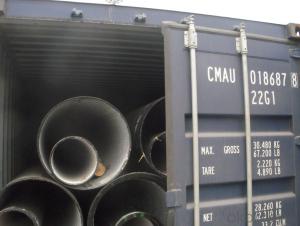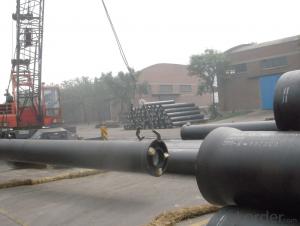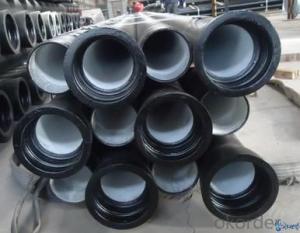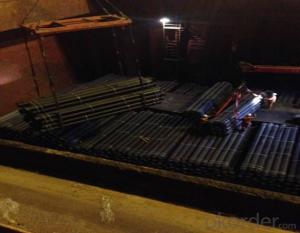DUCTILE IRON PIPES K9 DN100
- Loading Port:
- China Main Port
- Payment Terms:
- TT OR LC
- Min Order Qty:
- -
- Supply Capability:
- -
OKorder Service Pledge
OKorder Financial Service
You Might Also Like
Ductile Iron Cast Pipe is without any defects compare with tradition casting tech, which has many advantages particularly as follow:
(1) High density. In the "vertical upward casting" process, the melt iron of centre liquid column in center crystallizer is continuously feeding for volume shrinkage caused by condensation tube at outer circumference , which lead to be free of shrinkage porosity.
(2) High purity. When melt iron pouring, the mixed impurities such as gas, dross, sand grain which are lighter than melt iron could be eliminated at furnace mouth, its impossible to enter into the crystallizer through the channel, so the melt iron into the crystallizer is very pure.
(3) Strength with toughness. The cooling speed provided by continuous crystallizer is 30 times than sand casting and 5 times than centrifugal casting, and doesn't produce white iron, the eutectic cell volume of continuous cast iron is one eighth to one tenth compare with traditional cast iron. The density of graphite nodule in ductile iron can reach 300-700 pcs/mm2. Therefore, all reason above improve the strength and toughness of continuous cast iron.
(4) Free machining. The high speed cooling make the hardening phase (such as boride, steadite) not appear like reticular, massive or thick, but diffuse like fish bone and pane in shape, moreover, there are tiny graphite flakes inlaid hardening phase. It's free machining in BrinellHardness the range of 250-300HB. However, the Brinell Hardness of 250 is top limit to common metal materials.
(5) Uniform composition of tube wall. The convection mixing of liquid column caused by marching type drawing in crystallizer make the composition of tube wall well-distributed, and concentration gradient very little.
(6) High productivity. To the wall thickness of tube under 10mm, the speed of continuous casting is 1 meter/min, to the wall thickness of tube under 20mm, the speed of continuous casting is 0.5 meter/min, which is high efficiency that centrifugal or other casting tech couldn't reach.
- Q:Are ductile iron pipes suitable for use in wastewater pumping stations?
- Yes, ductile iron pipes are suitable for use in wastewater pumping stations. Ductile iron has excellent strength and durability, making it resistant to corrosion and capable of withstanding high pressure and heavy loads. It also has good flexibility, which helps prevent cracking or breaking under ground movements. Additionally, ductile iron pipes have a smooth internal surface, reducing friction and improving the flow of wastewater. Overall, these pipes are a reliable and long-lasting choice for wastewater pumping stations.
- Q:Can ductile iron pipe be used for water treatment plant sludge handling?
- Yes, ductile iron pipe can be used for water treatment plant sludge handling. Ductile iron pipe is known for its strength and durability, making it suitable for handling various types of fluids, including sludge. It can withstand the corrosive nature of sludge and is resistant to abrasion, which is important in a sludge handling system. Additionally, ductile iron pipe has a smooth interior surface, which helps to prevent clogs and allows for efficient flow of the sludge. Overall, ductile iron pipe is a reliable choice for water treatment plant sludge handling.
- Q:How are leaks repaired in ductile iron pipe?
- Leak repairs in ductile iron pipes are typically carried out using various methods depending on the severity and location of the leak. One commonly used technique is the application of epoxy-based sealants or leak repair clamps. For small leaks, epoxy sealants are commonly used. This involves applying a specialized epoxy compound to the leaking area, which then hardens and forms a durable seal over the leak. The epoxy is carefully applied to the surface of the pipe, covering the leakage point and any surrounding damaged areas. This method is effective for small leaks and can provide a long-lasting solution. In cases where the leak is larger or more severe, leak repair clamps are often employed. These clamps are designed to provide a mechanical seal over the leak, using rubber gaskets and bolts to secure the clamp tightly around the pipe. The pressure from the clamp compresses the gasket onto the pipe, creating a watertight seal and preventing further leakage. Leak repair clamps are available in various sizes to accommodate different pipe diameters. In both cases, it is crucial to properly prepare the pipe surface before applying the repair method. The area around the leak must be cleaned and dried thoroughly to ensure good adhesion of the epoxy or proper sealing with the clamp. Additionally, it is essential to follow the manufacturer's instructions and guidelines for the chosen repair method to ensure a successful and long-lasting repair. It is important to note that these repair methods are temporary solutions and may not be suitable for all situations. In some cases, particularly for extensive pipe damage or aging infrastructure, it may be necessary to replace the affected pipe section entirely. Professional assessment and guidance from qualified technicians or plumbers are recommended when dealing with leaks in ductile iron pipes to ensure proper repairs and minimize the risk of future issues.
- Q:Can ductile iron pipes be used for water treatment facilities?
- Yes, ductile iron pipes can be used for water treatment facilities. Ductile iron pipes are known for their strength, durability, and corrosion resistance, making them suitable for transporting water in various treatment processes such as filtration, disinfection, and distribution. Their ability to withstand high pressures and external loads makes them a reliable choice for water treatment facilities.
- Q:How to analyze and judge the quality of ductile iron pipe
- The quality of water supply pipe ductile is a topic worthy of discussion, how to judge the quality of the ductile iron pipe, ductile now on the market is all kinds of pipe, a name sand type ductile iron pipe, ductile water-cooling tube, K8 grade K9 grade ductile iron pipe, ductile iron pipe, also the brand is divided into ductile ductile pipe pipe, big brands, and some well-known manufacturers of producing ductile pipe,
- Q:Can ductile iron pipes be used in areas with high water velocity?
- Yes, ductile iron pipes can generally be used in areas with high water velocity. Ductile iron is known for its strength and durability, making it suitable for various applications, including high-velocity water flow. However, it is important to consider factors like pipe size, wall thickness, and proper installation techniques to ensure the pipes can handle the specific velocity conditions effectively.
- Q:Are ductile iron pipes resistant to chloride-induced corrosion?
- Yes, ductile iron pipes are resistant to chloride-induced corrosion. Ductile iron is a type of cast iron that has been treated with magnesium to make it more flexible and resistant to cracking. It has a ferritic microstructure which provides excellent resistance to corrosion caused by chlorides. Chloride-induced corrosion can occur when chloride ions in the water or soil come into contact with the metal surface, leading to the formation of corrosion products such as rust. However, the presence of magnesium in ductile iron forms a protective layer on the surface, preventing the chloride ions from reaching the metal and thus inhibiting corrosion. This makes ductile iron pipes suitable for a wide range of applications, including water supply and sewerage systems, where chloride exposure is common.
- Q:How does ductile iron pipe perform in areas with high water hammer?
- Areas with high water hammer are well-suited for the use of ductile iron pipe, as it exhibits exceptional performance in these conditions. The robustness and durability of ductile iron enable it to withstand the forceful impact of water hammer without experiencing significant damage. Water hammer is characterized by a sudden surge in pressure resulting from the rapid alteration of water flow direction or velocity, often occurring when valves are swiftly closed. This abrupt pressure change places substantial stress on pipes, potentially leading to ruptures or failures. Nevertheless, ductile iron pipes possess outstanding resistance to such impact due to their unique composition and manufacturing processes. These pipes are comprised of a blend of iron, carbon, and small quantities of other elements like silicon and magnesium. The formation of graphite nodules during manufacturing grants ductile iron its exceptional strength and flexibility, rendering it less prone to cracking or breaking under pressure. In environments where water hammer is prevalent, ductile iron pipe's inherent strength and resilience allow it to absorb and dissipate the force generated by water hammer events. Its capacity to endure sudden pressure changes aids in preventing pipe failures, thereby minimizing the risk of leaks or bursts. Furthermore, the smooth inner surface of ductile iron pipes reduces the likelihood of water hammer incidents by minimizing turbulence and maintaining a steady flow. This particular attribute assists in mitigating the impact of water hammer on the pipe system. Overall, ductile iron pipe emerges as an ideal choice for areas prone to high water hammer due to its exceptional strength, impact resistance, and ability to withstand abrupt pressure changes. Its performance under such conditions ensures the longevity and dependability of water distribution systems.
- Q:Can ductile iron pipe be used for hot water applications?
- Yes, ductile iron pipe can be used for hot water applications. It has excellent heat resistance and can withstand high temperatures, making it suitable for conveying hot water in various plumbing systems.
- Q:Can ductile iron pipes be used in tunneling or microtunneling projects?
- Yes, ductile iron pipes can be used in tunneling or microtunneling projects. Ductile iron pipes are known for their strength, durability, and flexibility, making them suitable for underground applications. They can withstand the external pressure exerted by the surrounding soil or rock during tunneling, ensuring the integrity and safety of the project. Additionally, ductile iron pipes have excellent corrosion resistance properties, which is crucial in tunneling projects where the pipes are exposed to moisture and other corrosive elements. Their smooth internal surface also facilitates the flow of fluids or materials through the pipes, making them an ideal choice for tunneling or microtunneling projects.
1. Manufacturer Overview |
|
|---|---|
| Location | |
| Year Established | |
| Annual Output Value | |
| Main Markets | |
| Company Certifications | |
2. Manufacturer Certificates |
|
|---|---|
| a) Certification Name | |
| Range | |
| Reference | |
| Validity Period | |
3. Manufacturer Capability |
|
|---|---|
| a)Trade Capacity | |
| Nearest Port | |
| Export Percentage | |
| No.of Employees in Trade Department | |
| Language Spoken: | |
| b)Factory Information | |
| Factory Size: | |
| No. of Production Lines | |
| Contract Manufacturing | |
| Product Price Range | |
Send your message to us
DUCTILE IRON PIPES K9 DN100
- Loading Port:
- China Main Port
- Payment Terms:
- TT OR LC
- Min Order Qty:
- -
- Supply Capability:
- -
OKorder Service Pledge
OKorder Financial Service
Similar products
New products
Hot products
Related keywords






























